Natural keto sweeteners are essential in many low-carb recipes to keep them sugar-free, healthy, safe, and palatable, so we’ve put together this comprehensive guide on sugar substitutes for reference.

Cutting out sugar can be pretty daunting for anyone that’s used to adding it to sweeten everything from coffee to snacks and desserts.
Luckily there’s a great variety of keto-friendly, low-carb, and natural sweeteners available that you can substitute sugar for, depending on what you’re cooking.
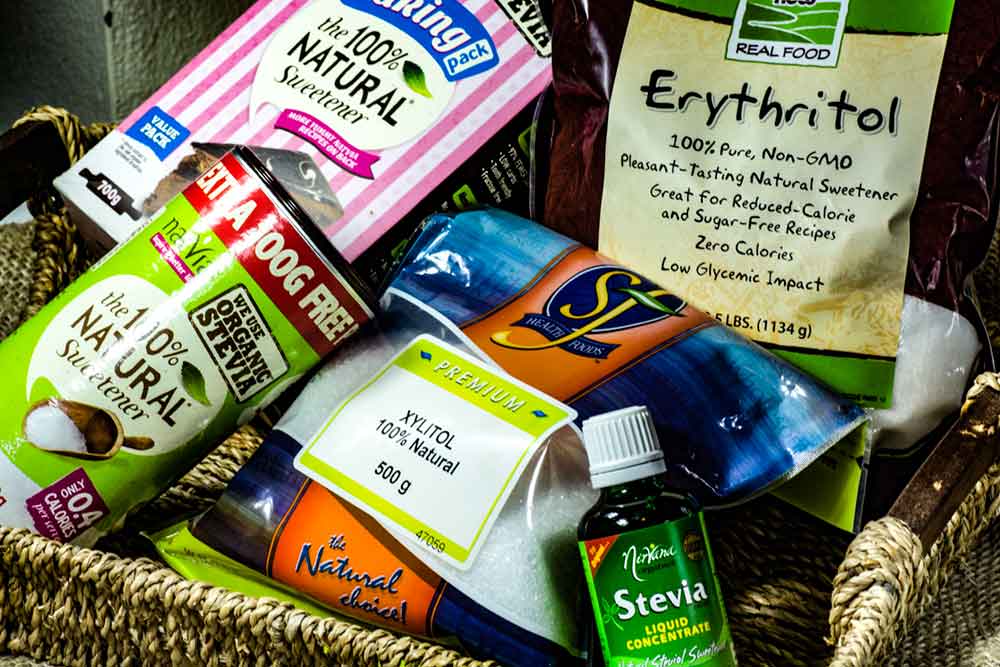
We use a variety of sweeteners in our keto recipes, and none of them will throw you out of ketosis.
All the sweeteners and sugar substitutes used in our recipes are natural and healthier than sugar.
Both artificial and natural sweeteners have varied intensities and flavors. (we always keep our sweeteners natural).
For example, we wouldn’t use pure Stevia in a fat bomb recipe that we wanted to taste like strawberries. We might use Stevia if we wanted to create sugar-free licorice, though.
Many of our keto recipes wouldn’t be possible without sugar substitutes. The sweetener we use is dependent on the recipe we’re cooking.
If you’re ever concerned about whether a sweetener or any food affects your ability to get into ketosis, use a Blood Ketone Meter (everyone on Keto should have one and track their ketone levels regularly).
1. Erythritol (Excellent for Baking)
Erythritol (along with erythritol blends) is our most used sweetener in cooking; we keep plenty of it on hand due to its easiness on the stomach and clean sweetness (no aftertaste).
Also, Erythritol makes an excellent bulking agent for low-carb keto baked goods.
Erythritol naturally occurs in some fermented foods and fruits. Erythritol is a sugar alcohol used as a natural low-calorie sweetener in place of sugar. Erythritol provides a fraction of the calories compared to the same amount of sugar.
Erythritol is a keto-friendly sweetener that you can use liberally in food recipes, particularly in low-carb desserts that require a crumbly consistency.
While we can tell slight variances in the taste of desserts with erythritol vs. sugar, we cannot tell which is the sugar dessert or the erythritol dessert, just that there is a slight difference.
One point to note is that erythritol is not hygroscopic (it does not attract moisture).
For this reason, when making recipes that require a moist texture, we use a blend of erythritol and stevia, such as Natvia (or another natural sweetener, depending on what we try to achieve).
If there were one contender as the best sugar substitute for baking cookies or crackers, and we could only choose one, it would be Erythritol.
- Erythritol occurs naturally in fruits and from fermentation.
- It is a sugar alcohol;
- It has zero impact on blood sugar and no side effects unless eaten in large doses.
- When taken in large doses (that you wouldn’t), nausea is the most common complaint.
- Erythritol is easy on the stomach and doesn’t cause bloating or gas like some sweeteners do in higher amounts.
2. Monk Fruit Sweetener (Luo Han Guo)
Monk fruit bears its name from the Buddhist Monks who would collect the melon-type fruit, then dry it and use it in herbal teas for medicinal and ceremonial purposes.
Monk fruit sweetener is a natural sugar substitute extracted from monk fruit. The botanical name for monk fruit is “siraitia grosvenorii”, and is also known as “luo han guo”, monk fruit is found in areas of South East Asia.
Monk fruit is very low-carb and keto-friendly it contains no calories and is 200 times sweeter than table sugar.
This sweetness of monk fruit comes from a chemical within the monk fruit called mogrosides.
There are no known side effects to consuming monk fruit, and it’s recognized by the United States Food and Drug Administration as safe.
Monk fruit is keto-friendly, and you can use it in low-carb baked recipes where sweetness is required. Start with adding a little bit at a time so as not to over-sweeten.
- Monk fruit is an excellent sugar substitute for keto, paleo, and other low-carb baking recipes.
- Monk fruit is 200 times sweeter than sugar, so you require very little when cooking.
- Monk fruit is not carb and does not spike insulin.
- Monk fruit is generally free of side effects.
- There are some suggestions that monk fruit may have anti-inflammatory benefits.
3. Xylitol Antibacterial Natural Sweetener
Xylitol is a natural sweetener that has antibacterial properties. It has a close resemblance to sugar without any aftertaste.
People often feel a slightly cold sensation in the mouth when eating xylitol. We use Xylitol sparingly as it can cause gastrointestinal upset.
Yes, xylitol is keto-friendly, but it should be limited to some desserts and beverages, such as coffee, that require only a little-added sweetness as it can upset stomachs in higher doses.
Xylitol is a natural sweetener that has antibacterial properties. It has a close resemblance to sugar without any aftertaste.
The Benefits Of Xylitol
- Xylitol has the added benefit of being anti-bacterial
- It has been used in medicine to control middle ear infections
- Xylitol’s anti-bacterial properties protect your teeth from decay-causing bacteria, and it is often found in sugar-free gum for this purpose.
- Gastrointestinal discomfort may occur in doses upward of 50 grams of Xylitol.
Be aware that xylitol is toxic to dogs, so don’t feed your keto snacks to Scooby.
4. Stevia
We use Stevia only in specific recipes and often as a blend with Erythritol (see Natvia below).
Stevia has a unique aftertaste, like aniseed, when used in tea or coffee.
Stevia is a natural plant-based sweetener with a sweetness of 150 times that of a corresponding amount of sugar.
Stevia is keto-friendly, has some great nutritional qualities, and is all-natural.
The Benefits of Stevia
- Stevia has no impact on blood sugar.
- Stevia contains magnesium, zinc, potassium, and vitamin B3.
- Due to its sweetness, a lot less of it is required.
If someone could bring that aftertaste under control, it would be our favorite sugar substitute for baking.
But that aftertaste is intense, and it really needs to be blended with erythritol.
When stevia is used sparingly or blended with others, it makes a fantastic sugar substitute for low-carb baking on a ketogenic diet.
5. Natvia (Stevia and Erythritol blend)
Natvia is a blend of stevia and erythritol, which makes it excellent for low-carb, ketogenic baking. We use it in many of our baked keto recipes that require sweetening.
The sweetness of stevia is still evident in Natvia without the strong aftertaste.
Erythritol’s bulking properties make it the perfect addition to cookie and cake recipes.
Natvia is available on shelves in Australia, New Zealand, and the United Kingdom. If you’re from the United States or elsewhere, you can get Natvia here from Amazon.
6. Swerve (Natural Keto Sweetener blend)
Swerve is another blended Keto-friendly sweetener product that is an excellent sugar substitute in low-carb cooking.
Like Natvia, Swerve is a blend of erythritol but with oligosaccharides instead of stevia.
Swerve has no aftertaste and does not impact blood glucose levels.
Swerve is ideal for cooking and is equal to sugars sweetness pound for pound. It works excellently as a sweetener in tea and coffee also.
Many people have substituted Natvia in our keto recipes for Swerve when Natvia is unavailable.
The tip here is to add the sweetener sparingly until you get the sweetness you require.
Oligosaccharides are fiber carbohydrates (your body does not absorb them) found in certain fruits and vegetables. Oligosaccharides have no impact on blood glucose and are beneficial in harvesting good bacteria in your digestive system.
7. Yacon Syrup
Yacon Syrup is made from the roots of the yacon plant. The syrup extracted from the Yacon plant is very sweet and is excellent for making sugar-free sauces (not at high heat, though).
Yacon syrup is processed similarly to that maple syrup using an evaporator.
Yes, yacon syrup is keto-friendly. A 2009 study found yacon syrup contributed to weight loss in obese patients with insulin resistance. This was due to the yacon plants’ high concentration of fructooligosaccharides.
Be aware that Yacon Syrup should not be used for high-heat dishes as the fructooligosaccharides break down past boiling point.
The Benefits Of Yacon Syrup
- Yacon Syrup is high in antioxidants.
- Yacon Syrup is an excellent source of potassium.
- Yacon Syrup has been proven to improve insulin resistance in obese patients.
- Yacon Syrup is high in fiber (be cautious in high doses).
The Best Natural Keto Sweeteners
List of the best Keto Sweeteners that we use regularly.
- Erythritol
- Monk Fruit Sweetener
- Stevia
- Xylitol
- Natvia
- Swerve
- Yacon Syrup
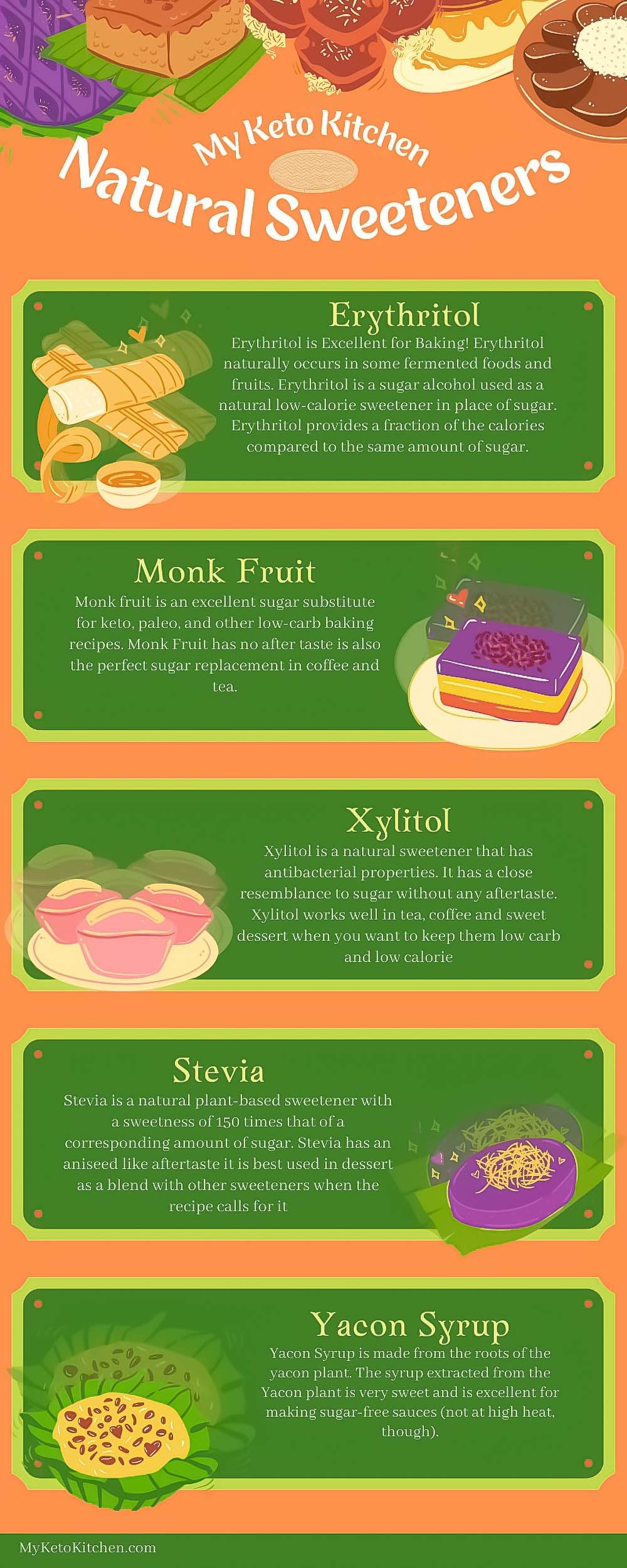
Sweeteners To Avoid On A Keto Diet
Aside from sugar, there are a variety of other foods commonly used to sweeten food that you should avoid on a keto diet.
Any substance used to sweeten that spikes insulin or raises blood glucose levels should be avoided on a keto diet.
List of the sweeteners that you should avoid on a keto diet:
- Coconut Sugar
- Honey
- Palm Sugar
- Maple Syrup
- Maltitol
- Sucralose
- Splenda (contains dextrose and maltodextrin)
- Agave Syrup
- Cane Sugar (table sugar)
- Dates
- Dextrose
- Maltodextrin
Beware of Maltitol in Low Carb Products
Maltitol is a sugar alcohol like erythritol. But unlike erythritol, maltitol has a high glycemic index (as shown in our table of sweeteners below).
Though maltitol’s glycemic index (GI) is significantly lower than refined sugar, it still has a GI above 30 and will impact blood sugar levels.
Is Maltitol Keto-friendly?
Maltitol is not keto-friendly and should not be used to sweeten products or recipes for those wanting to achieve ketosis.
Despite maltitol’s high GI rating, manufacturers and retailers still try to sneak it into products to fool the unsuspecting consumer.
What is Maltitol?
- Maltitol has far too much of an influence on blood sugar levels for the keto diet.
- Many on-the-shelf “low-carb” protein bars contain maltitol as the sweetener.
- Maltitol does not legally have to be included in “net carbs” on nutrition labels, but it does have to be listed as an ingredient (look for it, if it’s there, don’t buy the product).
- Maltitol is one of the most common sweeteners used in low-carb powders, meal replacements, and baked goods.
If you want to avoid maltitol products, consider choosing them from a keto-specific food company that will not include misleading ingredients.
These specialty companies have a customer base that tends to be well-educated on nasty fillers and sneaky sweeteners.
Innovative companies are beginning to replace maltitol with natural sweeteners such as stevia and erythritol that do not impact blood glucose.
Grabbing the educated segment of the health food market as consumers learn about food labeling.
Nutritional Values of Artificial Sweeteners & Sugar Substitutes
Below you’ll find the nutritional values of the most common artificial sweeteners, natural sugar substitutes, sugar alcohols, and common sugars.
We’ve broken the different sweeteners in the tables below into four columns:
- Calories per gram
- Sweetness Index
- Glycemic Index
- The Calories per teaspoon equivalent
The nutritional values are as follows:
Is Sucralose Keto Friendly?
Studies have shown that sucralose does not affect blood glucose or ketosis, so technically, it is keto-friendly.
But that does not mean you should include it in your keto diet, especially if you want to stay natural.
Research states that at high heat, sucralose becomes unstable and produces hydrocarbons. Evidence suggests hydrocarbons are cancerous.
So at least do not cook or bake with sucralose as a low-carb sweetener at high heat.
Sucralose is an artificial sweetener, so we tend to avoid it, especially when there are many natural alternatives.
Is Splenda Keto Friendly?
Splenda is a blend of dextrose, maltodextrin, and sucralose. It is not recommended for keto diets (see sucralose above).
Better blended alternatives to Splenda are Swerve and Natvia, both blends of natural keto-friendly sweeteners.
We use both Swerve and Natvia. They are excellent keto-friendly baking ingredients and work just as well as Slenda for taste as sweetness.
For more information, please read our article on the dangers of maltodextrin.
Is Saccharin Keto Friendly?
Saccharin may technically be keto-friendly, but our tip is to avoid it when more preferable natural sugar alternatives are available.
This artificial sweetener is becoming increasingly hard to find in products, so saccharin gets a big no.
References And Further Resources About The Safety Of Low-Carb, Keto-Friendly Natural and Artificial Sweeteners:
Yacon syrup: Beneficial effects on obesity and insulin resistance in humans
Sucralose, A Synthetic Organochlorine Sweetener: Overview of Biological Issues
If you have any cooking ideas with keto sweeteners and natural sugar substitutes, let us know below, we’d love to hear them.
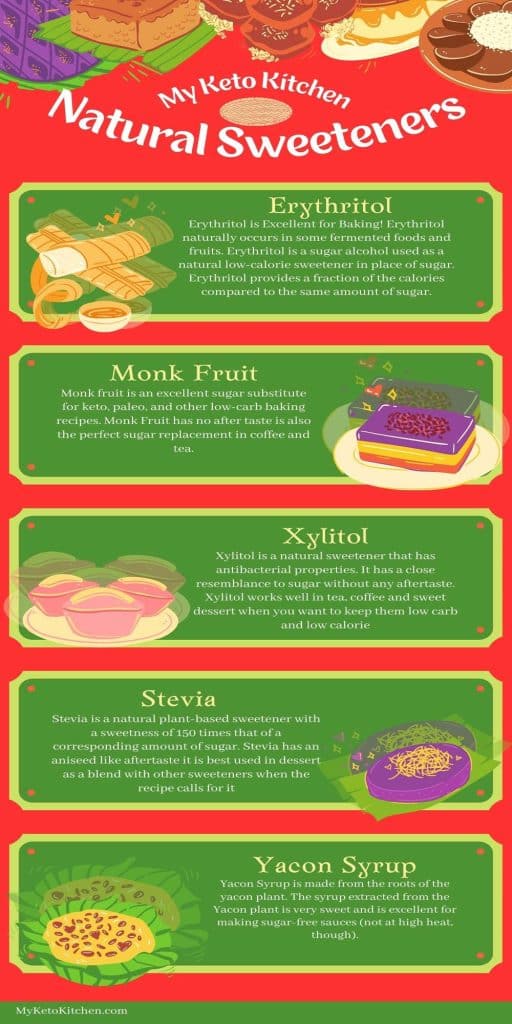
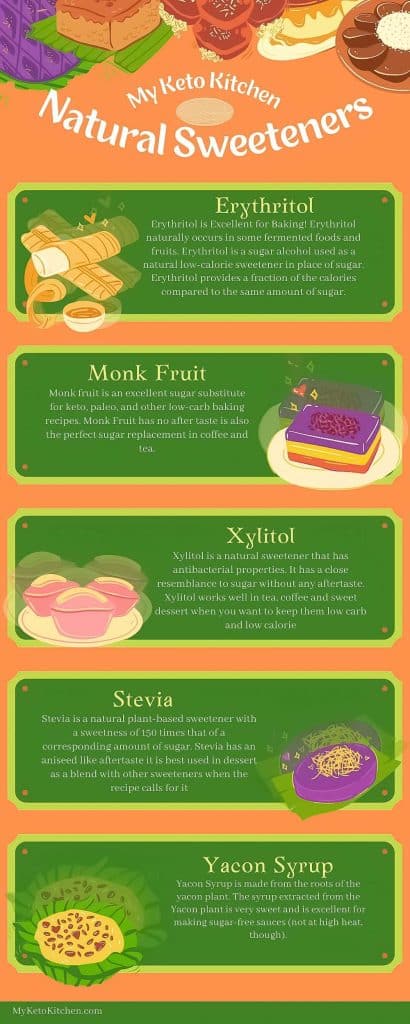
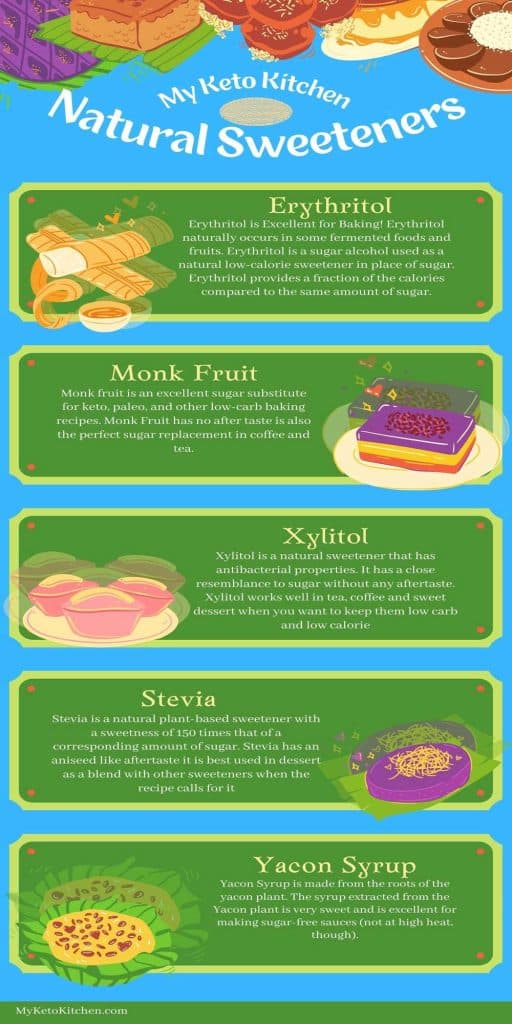




What are your thoughts on using Allulose as a sugar free sweetener?
Hi Marlene. Allulose is a great sugar substitute i’ll update the article when I have time. Thank you.
I have Type 2 diabetes and I also love to bake. Unfortunately I also have IBS-D and cannot tolerate sugar alcohols and artificial sweeteners. I have been trying to find recipes that use pure monk fruit. My main problem is finding information on how to adjust other ingredients in a recipe using pure monk fruit in order to compensate for the loss of the other things that sugar normally does in a baking recipe.
Hi Jeanne, I guess that comes down to experimentation. Usually with monk fruit we use 1.5 teaspoons in place of 1 teaspoon of sugar. Hope that helps.
I came to this post hoping to find a better option than Erythritol for keto baking.
I completely disagree with your statement that it has a “clean sweetness (no aftertaste).” I would agree to an extent when it’s used in non-baking, such as my morning keto coffee blend, but when baking I find a very unpleasant “sharp” taste which is prominent both while eating and as an after taste. Also, as a general rule I’ve found that most sweet baking recipes call for WAY too much Erythritol. Reducing the amount has helped with the “sharp” taste, but it’s still pretty obvious.
I bake with my daughter and she gets excited every time. But after one cookie she politely turns down offers for more, leaving the entire batch for me.
Do you have any suggestions so baking can become a fun experience again in our family?
Hi Natasha,
Have you tried using a mixture of sweeteners? My personal favorite is about 70% erythritol and 30% stevia. I found that the combination of the 2 cancels out the aftertaste of each one.
Would Erythritol be the best replacement for sugar in making toffee – which requires a high heat?
Hi Rosemary,
Xylitol would be better for making toffee as erythritol will crystallize when it cools.
I found this article extremely helpful and useful!~
I would suggest however in listing the limitations/cautions with each sweetner, that Xylitol is deadly/poisonous to pets! I use it sparingly and because I have a cat and dog, if I was not aware of this fact, I may inadvertently shared some thing I made with them and it could have been deadly.
Hi Tina,
We always warn about xylitol effects on pets in our recipes that use it. It’s very important that pet owners are aware of the foods that are toxic to their fur children!
What non sugar sweetener is best to use for making homemade candies such as fudge and truffles? Thanks!
Hi Lyn,
Xylitol is the sweetener that acts the most like sugar and will make a nice thick syrup and takes a few weeks before crystallization starts. Keep in mind that sweeteners are different to sugar and working with them will take a little experimentation to get good results. I hope that helps 🙂
This is so good, and very helpful to a newbie:)
THANK YOU!
What can I use in my coffee/tea? I tried stevia and found the after taste to be too much
Hi Latoyia,
Stevia does tend to have a funny aftertaste. I would recommend trying a brand of erythritol like Swerve, or a mixture of erythritol and stevia like Natvia.
I have found that liquid Stevia don’t have the aftertaste I get with powdered Stevia and tablets. I use liquid Stevia in my tea every day, no aftertaste 🙂
Excellent article! I just couldn’t take any more of Stevia’s aftertaste. I was able to purchase several of the cited products with the exception of xylitol; the link kept redirecting me back to the beginning of the article. Thank you for your research, this article answered several questions for me.
Thanks, Cheri,
Yes, Stevia has a distinct taste that’s for sure, it would make an excellent ingredient for licorice or something.
Thanks for letting us know about the link; we’ve fixed it ;).
I live in the US, I see a lot of your recipes call for Natvia, however it’s rather pricy on Amazon. I already have erythritol and stevia, what ratio would you suggest I blend the two to substitute for Natvia? Thanks so much!
Hi Belinda,
I believe Natvia is approximately 85% Erythritol and 15% Stevia, mixing your own will be a bit of trial and error based on whether you are using granulated, powdered or liquid version.
If you don’t wish to mix, Erythritol can be substituted in the place of Natvia.
I hope this helps
Gerri
It sure does, Gerri! Thank you for your reply!
Belinda